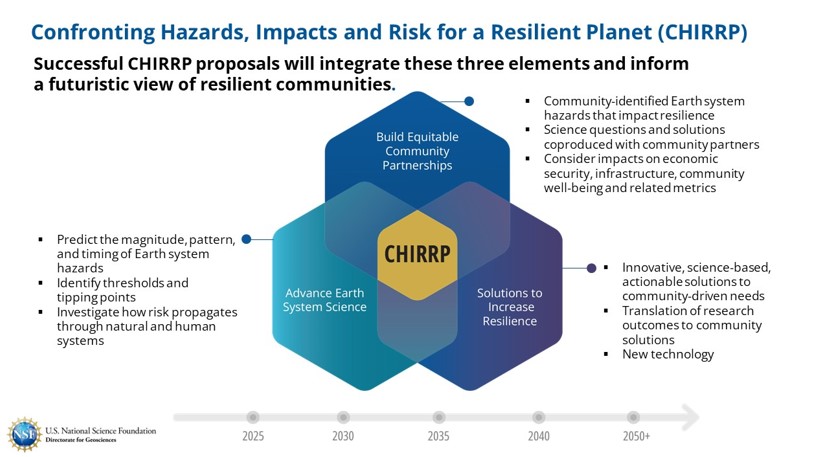The National Science Foundation Announces Confronting Hazards, Impacts and Risks for a Resilient Planet (CHIRRP)
March 11, 2024
Join March 25, 2024, Virtual Webinar with NSF Program Officers to Learn about the New CHIRRP Funding Opportunity to Support Co-Designed Projects to Safeguard Community Resilience
Natural hazards compounded by changing climates, rising populations, expanding demands for resources, and increasing reliance on technology are putting our economy, well-being, and national security at risk.
The goal of Confronting Hazards, Impacts and Risks for a Resilient Planet (CHIRRP) (PD 24-297Y) is to help safeguard communities and ecosystems for a resilient planet by supporting the co-design of projects that deliver evidence-based, actionable solution pathways reducing the risk from earth system hazards compounded by global environmental change.
Researchers, academics, and community leaders will work together on NSF-supported projects to advance understanding, forecasting and/or prediction of future Earth system hazards and risks, develop community-driven research questions, and inform actionable, science-based solutions that increase community resilience now and in the future.
CHIRRP projects will demonstrate convergence of three essential elements:
(1) Equitable community partnerships
(2) An Earth-system science approach to advance knowledge of hazards, impacts and risks
(3) Pathways to actionable solutions to increase increase environmental and societal resilience
Registration Required to Join CONFRONTING HAZARDS, IMPACTS AND RISKS FOR A RESILIENT PLANET (CHIRRP) FUNDING OPPORTUNITY Webinar
Date: Monday, March 25
Time: 3:00 PM – 4:00 PM EST
NSF invites you to a virtual webinar to have an interactive conversation about this new program. Program Directors will provide a brief overview of the new opportunity and then answer questions about it. Have your questions ready for the NSF team.
Register in advance for this webinar:
https://nsf.zoomgov.com/webinar/register/WN_TO-2xJjDSXWUuEQJ1O9URQ
Upon registration, you will receive an email confirmation with the log-in information for the meeting. Registered attendees may join the webinar five minutes prior to the official start time.
Questions? Contact nsfchirrp@nsf.gov
The U.S. National Science Foundation propels the nation forward by advancing fundamental research in all fields of science and engineering. NSF supports research and people by providing facilities, instruments and funding to support their ingenuity and sustain the U.S. as a global leader in research and innovation. With a fiscal year 2023 budget of $9.5 billion, NSF funds reach all 50 states through grants to nearly 2,000 colleges, universities and institutions. Each year, NSF receives more than 40,000 competitive proposals and makes about 11,000 new awards. Those awards include support for cooperative research with industry, Arctic and Antarctic research and operations, and U.S. participation in international scientific efforts.
Connect with us online
NSF website: nsf.gov
NSF News: nsf.gov/news
For News Media: nsf.gov/news/newsroom
Statistics: nsf.gov/statistics/
Awards database: nsf.gov/awardsearch/
Follow us on social
Twitter: twitter.com/NSF
Facebook: facebook.com/US.NSF
Instagram: instagram.com/nsfgov



